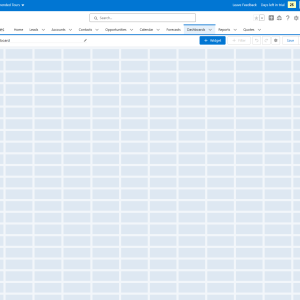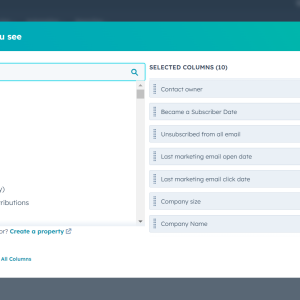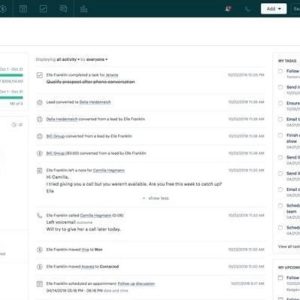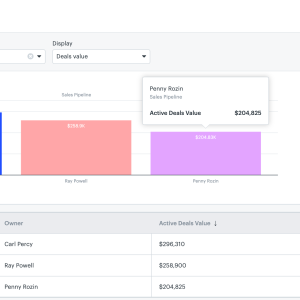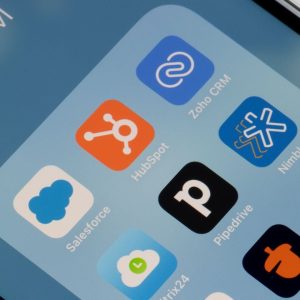In today’s competitive business landscape, having an efficient Customer Relationship Management (CRM) system is vital for the success of any sales team. A CRM software not only helps streamline sales processes but also enables teams to effectively manage customer interactions, track leads, and drive revenue growth. With countless CRM options available in the market, finding the best CRM for sales can be a daunting task. However, in this article, we will explore and analyze some of the top CRM solutions, taking into consideration their features, ease of use, integrations, and overall value for sales teams. Whether you are a small business or a large enterprise, the information provided here will assist you in making an informed decision to find the CRM that aligns with your sales goals and objectives.
Our in-depth research shows Zoho CRM is the best CRM for sales, as it offers an extremely impressive range of features while undercutting its competition on price. There are other great options when it comes to CRM for sales, though, including Salesforce for larger businesses and Freshsales for a lower price.
You are viewing: Best CRM for Sales
A good CRM for sales is going to be focused on providing a wide range of lead-focused features, like lead capture, lead communication, and lead conversion. Additionally, as with any CRM software, you’ll also want to look at team infrastructure features, customer support, and security. Fortunately, we’ve scored all of our top CRM for sales based on these criteria to give you the most in-depth information about each provider.
Below, you’ll find our top picks for CRM for sales, as well as some guidance on how to pick which one is best for your business. Check out the comparison table below for a quick look and read on for deep dive reviews on each one. Also, be sure to stop by our dedicated CRM comparison page for more information on the best options.
Best CRM Software for Sales
Looking for a CRM for sales? We’ve done the research, so you don’t have to! Check out our list of the top CRM software options for sales, complete with feature lists, pricing plans, pros, cons, and screenshots to get a better idea of what the best fit will be for your business.
- Zoho CRM – Best value for small businesses
- Salesforce Sales Cloud– Best for growing businesses
- HubSpot Sales Hub – Best free option but the real value is at enterprise-level
- Sugar Sell – A reasonable price for strong customization options
- Freshsales – Best combined Sales and Marketing CRM for SMBs
- Microsoft Dynamics 365 Sales – An expensive but robust tool for Microsoft users
- Zendesk Sell – Only the best if you’re looking to combine with Zendesk Support
- Keap – A suitable all-in-one platform for sales and marketing but a bit expensive
Zoho CRM
All right, we’ve done the research and we can firmly say that Zoho CRM is the best example of CRM out there for myriad of reasons. For one, it’s one of the more affordable options on the list, which understandably makes it attractive to any business looking for a new software solution. It even offers a solid free forever plan, which is the best way to test out the software before you buy.
On top of offering great affordability, Zoho CRM offers one of the most comprehensive feature catalogs on this list, which makes it an unbelievable value. You’re also getting great team features, meaningful customizability, and robust customer support, so you know that your money is going to something worthwhile.
All in all, Zoho CRM is one of the best CRM out there, regardless of your needs In fact, we found that Zoho CRM is also the best CRM for small businesses, so if you’re working with a tiny team, this CRM is still a good fit.
Zoho CRM Pricing
Zoho CRM offers a whole bunch of pricing plans, one of the most on this list in fact. The five pricing plans, in addition to the free forever plan, offer everything from increasing storage, improved customer support, and advanced sales features that can seriously improve your business.
The first few plans, Standard and Professional, offer the basic sales CRM functionality, with perks like lead scoring available to all. The next plan, Enterprise, adds the team infrastructure features that can help you run your team. The last plans, Ultimate and Plus, add 24/7 live support for your team, as well as additional storage for bigger teams.
Salesforce Sales Cloud
If you’re in the market for a CRM, there’s a pretty good chance you’ve heard of Salesforce. Particularly for sales, Salesforce is the most popular CRM on the market, boasting nearly 20% market share in 2020. Understandably, we’ve got Salesforce Sales Cloud as our one of top options for CRM for sales, thanks to a number of important criteria.
For one, Salesforce is unmatched when it comes to customer support, training, onboarding, and security, scoring full marks in our research across the board. Additionally, it offers some of the most robust analytics available today, so you can understand how your business functions and where it can improve.
Most importantly, Salesforce is a customizable platform with lots of features that can handle whatever your business needs, particularly when you utilize the Lightning interface over the Classic. It is scalable with your business and can handle team management features with aplomb.
On top of that, Salesforce offers some of the best sales analytics available, providing robust sales forecasting tools for businesses of all sizes. Overall, if you’re a larger business looking for sales CRM, you just found it.
Salesforce Sales Cloud Pricing
Salesforce pricing is pretty cut and dry, offering four different pricing plans that range in features as you pay more. The Essentials plan is quite affordable but pretty bare bones, not providing much in the way of advanced features that make Salesforce so great. The Professional plan is three times the price but really unlocks some great features, namely lead scoring which can make a big difference for sales companies.
The next two plans — Enterprise and Unlimited — are quite expensive, ranging from $150 to $300 and this is where the customizability comes in. These plans unlock the API access, so you can really use the platform to its highest potential. The most expensive plan also adds 24/7 support, which will help if you’re struggling to understand the very robust platform.
Learn more in our full guide to Salesforce pricing and plans.
HubSpot Sales Hub
Big businesses need bigger platforms, and HubSpot Sales Hub is an excellent option for enterprise-level organizations. It’s plentiful features and vast scalability across its many plans make it easy for businesses to really improve with the platform, allowing for growth without cutting into your budget too much.
HubSpot Sales Hub also offers the most extensive tools for managing the contract and payment aspect of sales, which isn’t as common as you’d think in the industry. In fact, HubSpot Sales Hub offers the best lead conversion options on the list, so if that’s what you’re in the market for, we recommend opting for HubSpot.
HubSpot Sales Hub Pricing
HubSpot offers three different pricing plans, as well as a free forever plan that provides you with basic functionality for sales, marketing, and customer service — we wouldn’t recommend sticking with this plan, but it’s the best free CRM we’ve tested, thanks to being so easy to use. The Starter plan is slightly more affordable than Salesforce’s first plan and provides more features, although it’s seriously lacking when it comes to analytics.
See more : Best Alternatives to Salesforce – Features and Pricing Compared
The more expensive plans — Professional and Enterprise — are where you get the analytics, as these plans unlock access to custom reports. You’ll also get access to lead scoring features, which make it easier to know which sales are going to be the easiest to make. The Enterprise plan is the best of the bunch and even has predictive scoring built in, which will automate your processes.
Learn more in our full guide to HubSpot pricing and plans.
Sugar Sell
If you’re after some serious customizability but don’t want to pay for the more expensive plans from Salesforce or HubSpot, Sugar Sell could be the perfect fit for your business. At a relatively low price point, you’ll be able to take advantage of custom reports to fully understand how your business operates how you want.
Sugar Sell is a bit limited when it comes to leads, offering rudimentary features for capture, communication, and conversion. Still, the price makes it pretty competitive, as long as you aren’t looking to performance these more advanced tasks. It is worth noting that if you want to acquire customers through online channels, Sugar Sell can’t help, and you’ll need to purchase another platform.
Sugar Sell Pricing
SugarCRM makes it easy when it comes to pricing: it only offers a single pricing plan for each of its platforms, so Sugar Sell comes in at $80 per user per month, and there are no other options. While it may seem high compared to the starting prices of Salesforce and HubSpot, it’s better compared to their more expensive plans, which makes it quite a steal.
You get all the analytics you’d expect from an enterprise-level pricing plan, as well as lots of customizability with access to an API and a wide range of business operations features to manage your team more effectively.
Learn more in our full guide to SugarCRM pricing and plans.
Freshsales
We’ve seen a lot of CRM for sales that are geared towards larger businesses so far, but what if you’re a smaller business that needs a CRM for sales that won’t completely decimate your budget? Freshsales is a stellar small operation CRM, as the prices are quite low without sacrificing too much when it comes to features.
One of the bright spots for Freshsales is that is provides great customer engagement features, allowing you to attract more engagement with your business. Unfortunately, the downside is that it doesn’t provide a lot of features for managing individual workflows, which can be a big hit to productivity if you’re got a bigger team to manage.
Freshsales Pricing
Freshsales is another CRM for sales that provides a free forever plan, in addition to three pricing plans for its users. The free plan is understandably limited, and we really wouldn’t recommend it for any business that seriously wants to improve sales. It’s a great long-term free trial though and can save you a bit of money when you’re starting out.
The Growth plan is much more affordable than most plans on this list, and provides you a good chunk of features, including solid lead communication and conversion options. The Pro plan unlocks more when it comes to lead capture, as well as the majority of the team infrastructure features. The Enterprise plan allows for bit more customizability and advanced analytics, but doesn’t add too much overall, so make sure you actually need these features before paying the extra amount.
Microsoft Dynamics 365 Sales
The value of having a CRM that easily integrates with your other systems cannot be overstated, and Microsoft Dynamics 365 Sales is an integration machine. With many businesses already set up with Microsoft Dynamics 365 for other business operations, adding the sales arm will supercharge your sales efforts without adding another software to sign in to. It provides a similar functionality to Salesforce or HubSpot, all in a Microsoft package that is easy to use.
Still, there are some downsides. For one, Microsoft Dynamics 365 is pretty expensive, and it offers limited functionality when it comes to lead capture and communication. Still, this level of integration could be worth it if you’re already using Microsoft, so make sure to consider these downsides before making your choice.
Microsoft Dynamics 365 Sales Pricing
Microsoft Dynamics 365 Sales offers four different pricing plans for its platform, and they’re all on the slightly expensive side. Starting at $65 per user per month, the Professional offers a lot in analytics, customer support, and integrations. Still, for the price, you don’t get a lot of lead-focused features, which is unfortunately the case with most plans.
The Enterprise plan is next, and it unlocks some great automation features to save your team some time. Lead scoring will also be available, but you’ll have to pay extra. The Premium plan doesn’t add much, except access to predictive lead scoring, which can save your team even more time. Finally, the Relationship Sales plan adds a specific integration with LinkedIn Sales Navigator.
Zendesk Sell
Zendesk is one of our top picks for CRM for customer support, but the reality is that Zendesk Sell doesn’t provide a whole lot of incentive to buy for Sales teams, compared to other options on this list. It’s not more affordable than the budget-options and it’s not more robust than the heavy hitters. Simply put, it’s a middle of the pack option with good enough features and team infrastructure, but there’s no reason to opt for it over another.
The reason we included Zendesk on this page, as on of the best CRM for Sales, is simply because it integrates well with other Zendesk offerings, including Zendesk Support, which we believe is one of the best CRM for customer support. So, if customer service is important to your business, or you’re already operating with Zendesk’s helpdesk solution, Zendesk Sell would be the best choice for you. Otherwise, we wouldn’t necessarily recommend trying out Zendesk Sell on its own, with all these other great options available.
Check out our Zendesk Sell review for more information about this platform
Zendesk Sell Pricing
Zendesk Sell offers four different pricing plans with varying features depending on the cost. The first plan, Team, offers an attractively low price, but not lower than Freshsales, and it comes with barely any lead-focused features and minimal customizability. Professional is the plan that unlocks a bit more at a notably less attractive price, but you only get a few more lead features.
The more expensive plans — Enterprise and Elite — finally get the ball rolling with some lead scoring and advanced analytics, with the latter adding a sales rep performance dashboard for a clear view of your team. These plans are both pretty expensive for how few features they offer, so again, we recommend checking out the other options on this list.
Keap
Keap is unique in the CRM space, as it offers dual functionality as a sales and marketing option, regardless of what you pay. The platform is built to do both so that you can more effectively communicate between teams. There are some drawbacks though, particularly with scalability, as it provides very few team infrastructure features to organize larger teams.
See more : 5 CRM Examples Most Suited for Small Businesses
Keap does have some great customer support options, so getting help when you’re having trouble will be no issue at all. The price is a bit high, but the lack of a “per user” pricing model means that you can save if you’ve got a smaller team.
Keap Pricing
The biggest draw of Keap is the price model. Unlike most CRM, it doesn’t charge you per user, so you can keep costs low if you’re a smaller team. They do put a limit on how many users can access the platform, though, so make sure that limit won’t hinder your ability to use it to its full potential.
The Pro plan unlock some of these customizations and automations and allows you to add additional users for $30 per month. The Max plan adds some lead scoring and that’s about it. Suffice it to say, the price may be attractive, but you can find better. Finally, the Max Classic plan adds even more, but you’ll have to contact their sales team to get a quote, as pricing is not publicly available.
How to Choose a CRM for Sales for Your Business
That’s a lot of great CRM software for sales options and we’ve done a lot of research on many of them. With all this information, it would be understandable if you felt a bit overwhelmed at your choices. Fortunately, we can walk you through what you should be considering when looking to a CRM for sales, so you can make the right pick the first time around.
Team size
As you’ve learned so far, CRM software offers a wide range of functionality, and much of it is geared towards the size of your team. After all, you aren’t going to need every feature under the sun if you’re a small startup with only a few clients. Subsequently, understanding which CRM are geared towards larger teams versus small organizations can save you money and help you get a handle on the platform without too much guidance.
For example, our top pick for CRM for Sales is Salesforce, which by most accounts is geared towards larger businesses, due to the larger feature catalog. If you’re a small business looking for a CRM, Freshsales is one of the better options, offering a low-cost platform without sacrificing too much.
Budget
Speaking of price, it’s arguably one of the most important factors to consider when buying virtually anything, and the same is true for CRM for sales. With wide range pricing options in the industry and within each provider, you’ll need to get your budget established before you make a decision. Even if you find the right provider for you, most provide a variety of pricing plans you’ll have to choose from, so knowing your minimums and maximums can make the choice that much easier.
Sugar Sell is a great example. While it might seem like the most expensive option from the list, the reality is that it provides a lot for the price. Other CRM have starting prices much lower than that, but their more expensive pricing plans dwarf Sugar Sell in comparison. Subsequently, understanding value is key in making the right choice for your CRM for sales.
Business needs
There’s a good chance you’re looking for CRM for sales because you need a particular feature or functionality to improve your business. Unfortunately, not every CRM offers every feature, so it’s going to be important for you to check out feature lists to ensure that you’re getting exactly what you need from your desired platform.
If you’re looking for lead capture, for example, Salesforce might not be the best fit for you. HubSpot and Freshsales both offer significantly better lead capture features than Salesforce, which means those platforms will be a better option for your business.
Methodology: How We Test CRM for Sales
We take our impartial research and analysis seriously, so you can have complete confidence that we’re giving you the clearest, most useful recommendations.
After conducting an initial exploration to identify the most relevant, popular, and established tools in the market, we put them through their paces with hands-on testing to see their real strengths and weaknesses. In this case, we put 13 CRM systems to the test across 84 areas of investigation.
Based on years of market and user needs research, we’ve established a CRM testing methodology that scores each product in six main categories of investigation and 13 subcategories; this covers everything from the available features and scalability capacity to the product’s value for money, and much more.
Our main testing categories for CRM systems are:
Features: the functionalities and capabilities provided by the CRM software, such as contact management, lead and opportunity tracking, and task and activity management.
Help and Support: the resources and assistance available to users when they encounter issues or require guidance while using the CRM software.
Customisation: the ability to tailor the CRM software to suit the specific needs and processes of the organization, e.g. customizing fields, layouts, and workflows.
Scalability: the ability of the CRM software to accommodate the growth and changing needs of the organization, such as the capacity to handle a growing customer database.
Price: the cost associated with using the CRM software. It includes factors such as licensing fees, subscription plans, and additional charges for add-on modules or features.
Team Structure – Sales CRM: determining if a platform makes it easier to manage large sales teams, including team dashboards, team hierarchies, and team inboxes.
Usability – Small Business CRM: assessing the simplicity of the interface, the ease of navigating through menus and options, and the overall user experience.
When it comes to calculating a product’s final score, not all testing areas are weighted evenly, as we know some aspects matter more to our readers than others, which are merely “nice to have.” After hundreds of hours, our process is complete, and the results should ensure you can find the best solution for your needs.
At Techfuzzy, we have a number of full time in-house researchers, who re-run this testing process regularly, to ensure our results remain reflective of the present day
Learn more about our research.
That’s a wrap on “ Best CRM for Sales ” We hope you’ve found a trove of useful insights and fresh perspectives. Your opinions and ideas matter to us—join the conversation below and share your take! Hungry for more tech insights? Dive into our diverse collection of articles where innovation meets practicality. Discover More CRM Softwares.
Stay in the loop with the latest in AI and tech – your journey into the digital future continues at techfuzzy.com.
#CRM #Sales
Source: https://techfuzzy.com
Category: CRM
